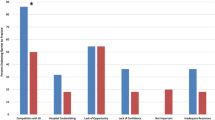Abstract
Background
The Gastroenterology Core Curriculum and American Society of Gastrointestinal Endoscopy provide guidelines for endoscopic training. Program adherence to these recommendations is unclear. This study aims to assess endoscopic training experience during fellowship.
Methods
Design: Questionnaire study. Setting: The questionnaire was circulated to US fellowship programs, with the assistance of the American Gastroenterological Association. Participants: Graduating third-year fellows.
Results
Seventy-three fellows returned the questionnaire. Nearly all fellows met the required numbers for esophagoduodenoscopy (98 %) and colonoscopy (100 %), with fewer meeting requirements for PEG (73 %) and non-variceal hemorrhage (75 %). The majority of fellows did not meet minimum numbers for variceal banding (40 %), esophageal dilation (43 %), capsule endoscopy (42 %). Fellows rated training in cognitive aspects of endoscopy as 3.86 [1 (inadequate), 5 (excellent)] and reported greatest emphasis on interpreting endoscopic findings and least on virtual colonography. Quality indicators of endoscopy received little emphasis (rating of 3.04; p = 0.00001), with adenoma detection rate being least emphasized. Fifty-six percent of fellows reported having routine endoscopy conferences. Half of the programs have endoscopic simulators, with 15 % of fellows being required to use simulation. Following direct hands-on experience, fellows rated external endoscopy courses (64 %) as the next most useful experience.
Conclusions
Many fellows do not meet required numbers for several endoscopic procedures, and quality indicators receive little emphasis during training. Most programs do not provide simulation training or hold regular endoscopy conferences. Fellowship programs should perform internal audits and make feasible adjustments. Furthermore, it may be time for professional societies to revisit training guidelines.

Similar content being viewed by others
References
National Institutes of Health, U.S. Department of Health and Human Services (2009) Opportunities and challenges in digestive diseases research: recommendations of the national commission on digestive diseases. National Institutes of Health, Bethesda NIH Publication 08-6514
Cherry DK, Hing E, Woodwell DA, Rechsteiner EA (2008) National ambulatory medical survey: 2006 summary, vol 3. National Center for Health Statistics, Hyattsville
American Association for the Study of Liver Diseases, American College of Gastroenterology, American Gastroenterological Association (AGA) Institute, American Society for Gastrointestinal Endoscopy (2007) The gastroenterology core curriculum, third edition. Gastroenterology 132:2012–2018
Training Committee ASGE, Adler DG, Bakis G, Coyle WJ et al (2012) Principles of training in GI endoscopy. Gastrointest Endosc 75:231–235
American Society for Gastrointestinal Endoscopy (ASGE) Training Committee (2012) Colonoscopy core curriculum. Gastrointest Endosc 76:482–490
American Society for Gastrointestinal Endoscopy (ASGE) Training Committee (2004) Esophagogastroduodenoscopy (EGD) core curriculum—June 2004. ASGE.org. http://www.asge.org/assets/0/71328/71340/022e0ff663bd455bb5a0476272aa871c.pdf. Assessed on 1 May 2014
Gastroenterology Leadership Council: American Association for the Study of Liver Disease, American College of Gastroenterology, American Gastroenterological Association, American Society for Gastrointestinal Endoscopy (2003) Training the gastroenterologist for the future: the gastroenterology core curriculum. Gastroenterology 124:1055–1104
ASGE Technology Committee (2005) Ensuring Competence in Endoscopy prepared jointly by the ASGE Task Force on Ensuring Competence in Endoscopy and the ACG Executive and Practice Management Committees
Sedlack RE (2010) The mayo colonoscopy skills assessment tool: validation of a unique instrument to assess colonoscopy skills in trainees. Gastrointest Endosc 72:1125–1133
Bjorkman DJ, Popp JW (2006) Measuring the quality of endoscopy. Gastrointest Endosc 63:S1
Faigel DO, Pike IM, Baron TH et al (2006) Quality indicators for gastrointestinal endoscopic procedures. Gastrointest Endosc 63:S3–S9
Cohen J, Safdi MA, Deal SE et al (2006) Quality indicators for esophagogastroduodenoscopy. Gastrointest Endosc 63:S10–S15
Rex DE, Petrini JI, Baron TH et al (2006) Quality indicators for colonoscopy. Gastrointest Endosc 63:S16–S28
Acknowledgments
Materials and financial support were provided by Harvard Digestive Diseases Center at Harvard Medical School (DK034854).
Disclosures
Drs. Pichamol Jirapinyo and Avlin B. Imaeda have no conflicts of interest or financial ties to disclose. Dr. Christopher C. Thompson is a consultant for Olympus and has received a research grant for laboratory equipment.
Author information
Authors and Affiliations
Corresponding author
Rights and permissions
About this article
Cite this article
Jirapinyo, P., Imaeda, A.B. & Thompson, C.C. Endoscopic training in gastroenterology fellowship: adherence to core curriculum guidelines. Surg Endosc 29, 3570–3578 (2015). https://doi.org/10.1007/s00464-015-4110-4
Received:
Accepted:
Published:
Issue Date:
DOI: https://doi.org/10.1007/s00464-015-4110-4




